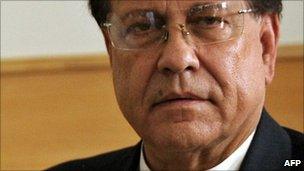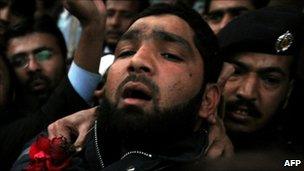Taseer's death exposes fissures in Pakistani society
- Published

Salman Taseer thought Pakistan's blasphemy laws were discriminatory
Punjab Governor Salman Taseer was one of Pakistan's best-known political figures, but his death has revealed much more about this country than just its politics.
It has exposed the deep fissure that runs through society here, and some signs of the direction in which this country appears to be heading.
There are still questions as to whether Mumtaz Qadri, the assassin and one of the governor's own bodyguards, acted alone, or with the backing of a radical movement.
But his motive appears clear - he was angered by Salman Taseer's stance against Pakistan's stringent blasphemy laws.
The governor felt they discriminated against Pakistan's religious minorities and was the most prominent supporter of a Christian woman in Punjab who was sentenced to death for insulting the Prophet Muhammad, something she denied doing.
'Feted celebrity'
That made him something of a hate figure among some radical, fundamentalist quarters.
For some of them Qadri, the man accused of killing him, has become a feted celebrity.

Some in the country have said that Qadri is a hero
In the city of Peshawar, a demonstration has been held to celebrate Salman Taseer's murder and there were chants calling for Mumtaz Qadri's release.
"We, all the students, are proud of the job which Mumtaz performed," said one demonstrator. "We all are with him."
"The governor said the blasphemy law was a black law, that's why Mumtaz killed him," says another. "He did a tremendous job."
This is one - admittedly extreme - guise of Pakistan though it has shown itself elsewhere since Mr Taseer's death - on social networking sites, and radio phone-in programmes.
But there are also many Pakistanis who have been profoundly affected by what has happened, and are mourning the loss of a liberal hero.
This evening, at the spot where Mr Taseer was killed in Islamabad, was an altogether different gathering of people from the one in Peshawar, of people with a very different outlook.
For them, Qadri's alleged act was an attempt to rob them of their liberty too.
'Eye-opener'
"It is a very, very shocking incident," said one man at the candlelit vigil in Kohsar Market.
Salman Taseer speaking the BBC in November 2010: "I feel that the Pakistan we want is a progressive and liberal Pakistan"
"I would say it's an eye-opener for the mainstream political parties. They should close ranks and deny religious parties the space they have which fuels a lot of radical people like the person who killed Salman Taseer."
"We are small in numbers when we speak against all this extremism that's going on," one lady tells us.
"There are many people who will not come out because they're afraid. My children want to go abroad rather than be suppressed in this manner."
The governor's brutal death could spark debate as to what type of society Pakistanis want for themselves - one which is moderate and progressive, or one which is conservative and hard-line.
But it could also simply have the effect of silencing those, like Mr Taseer, who want to stand up for those they feel are being unfairly persecuted.
In November, when I last met Salman Taseer, he repeatedly voiced his belief that Pakistanis were an inherently liberal, humane people. He insisted they would ultimately reject extremism.
He pointed out that, in elections, religious parties have never done particularly well in Pakistan.
But the manner of Mr Taseer's passing is an indication to many that the radical elements within this society, however small or large they may be in number, are the ones currently forcing the agenda.
- Published5 January 2011
- Published4 January 2011
- Published4 January 2011
- Published3 January 2011
- Published3 January 2011
- Published7 December 2010